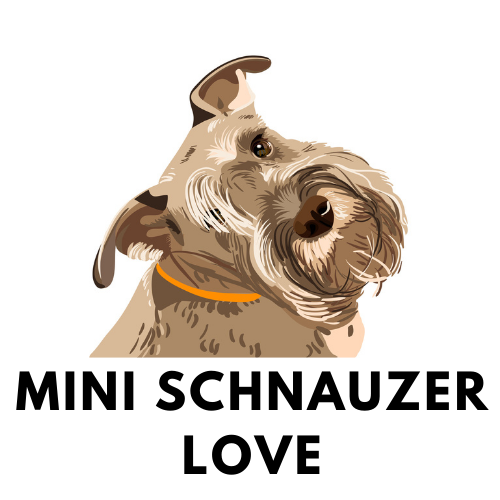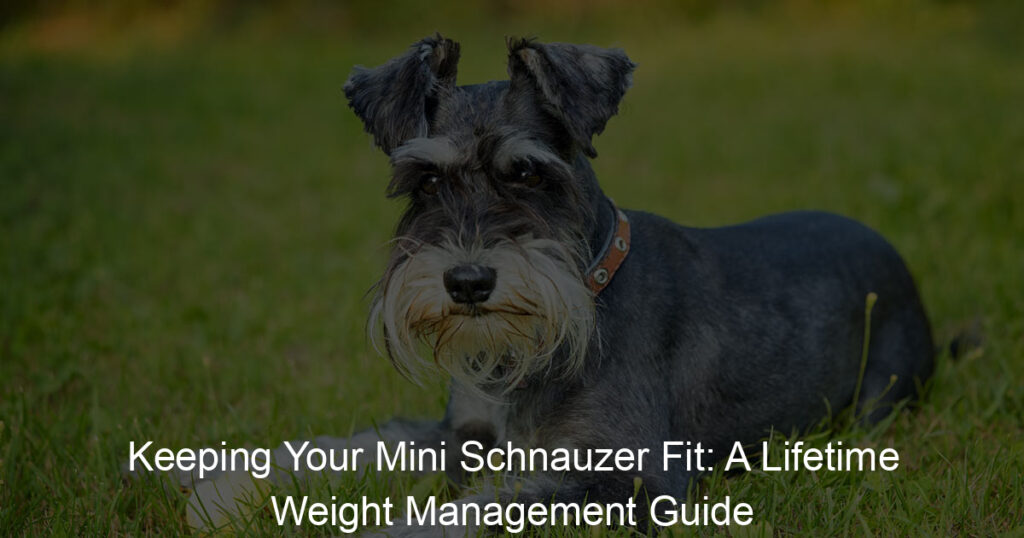
Introduction to Mini Schnauzer Weight Management
Weight management is a crucial aspect of ensuring the health and longevity of your Mini Schnauzer. It is not just about maintaining an ideal weight, but also about understanding the unique needs of this breed. In this section, we will delve into the importance of weight management for Mini Schnauzers and dispel some common misconceptions about their weight.
- Understanding the Importance of Weight Management for Mini Schnauzers
- Common Misconceptions About Mini Schnauzer Weight
Weight management is more than just keeping your Mini Schnauzer from becoming overweight. It’s about ensuring they are receiving the right nutrients and maintaining a healthy lifestyle that suits their breed characteristics. Mini Schnauzers, like other small breeds, have a fast metabolism, which means they can quickly gain weight if not properly managed. This can lead to a host of health issues, including diabetes, heart disease, and joint problems.
Moreover, managing your Mini Schnauzer’s weight is also about ensuring they are not underweight. An underweight Mini Schnauzer can suffer from malnutrition, leading to a weakened immune system and increased susceptibility to diseases. Therefore, understanding the importance of weight management for your Mini Schnauzer is the first step towards ensuring their overall health and well-being.
There are several misconceptions about Mini Schnauzer weight that can lead to improper care. One common misconception is that Mini Schnauzers can eat as much as larger breeds. This is not true. Due to their smaller size and faster metabolism, Mini Schnauzers require less food and more frequent meals.
Another misconception is that Mini Schnauzers don’t need as much exercise as larger breeds. While it’s true that Mini Schnauzers don’t require as much physical activity as larger breeds, they still need regular exercise to maintain a healthy weight and prevent obesity. Therefore, it’s important to understand these misconceptions to provide the best care for your Mini Schnauzer.
Understanding Mini Schnauzer Ideal Weight
When it comes to the health and well-being of your Mini Schnauzer, understanding their ideal weight is crucial. This section will help you identify the ideal weight range for Mini Schnauzers and understand the factors that can affect this weight.
- Identifying the Ideal Weight Range for Mini Schnauzers
Mini Schnauzers, like all breeds, have an ideal weight range that is considered healthy. This range is typically between 12 to 20 pounds (5.4 to 9.1 kilograms). However, the ideal weight for your Mini Schnauzer can vary depending on their age, size, and overall health condition. It’s important to consult with your vet to determine the best weight for your specific dog.
Keeping your Mini Schnauzer within this weight range can help prevent health issues such as obesity, heart disease, and joint problems. It can also contribute to a longer, happier life for your pet.
- Factors Affecting the Ideal Weight of a Mini Schnauzer
Several factors can affect the ideal weight of a Mini Schnauzer. These include:
- Age: Puppies and young dogs may weigh less than adults due to their smaller size and ongoing growth.
- Gender: Male Mini Schnauzers often weigh slightly more than females.
- Activity Level: Active Mini Schnauzers may weigh less due to burning more calories, while less active dogs may weigh more.
- Diet: The type and amount of food your Mini Schnauzer eats can significantly impact their weight.
- Health Conditions: Certain health conditions, such as thyroid issues or diabetes, can affect your Mini Schnauzer’s weight.
Understanding these factors can help you better manage your Mini Schnauzer’s weight and overall health. Remember, maintaining a healthy weight is a key part of ensuring a long, happy life for your pet.
Maintaining Mini Schnauzer Weight
Keeping your Mini Schnauzer at a healthy weight is crucial for their overall health and longevity. One of the key aspects of weight management is their diet. Let’s delve into this topic.
Mini Schnauzer Diet
A balanced diet is the cornerstone of your Mini Schnauzer’s health. It not only provides the necessary nutrients but also helps in maintaining an ideal weight. Here are some important points to consider:
- Choosing the right food for your Mini Schnauzer
- Understanding the role of diet in Mini Schnauzer weight control
When it comes to feeding your Mini Schnauzer, quality matters more than quantity. Opt for high-quality dog food that is rich in protein and low in fats. Foods with whole grains, vegetables, and lean meats are excellent choices. Avoid foods with artificial additives and fillers. Remember, every dog is unique, so what works for one may not work for another. It’s always best to consult with your vet before making any significant changes to your dog’s diet.
Diet plays a pivotal role in weight control. Overfeeding or feeding your Mini Schnauzer the wrong type of food can lead to weight gain and associated health problems. On the other hand, a balanced diet can help maintain a healthy weight and prevent obesity. It’s important to understand that a diet is not just about the type of food, but also about portion control and feeding times. Regular meals in controlled portions can help keep your Mini Schnauzer’s weight in check.
In conclusion, a balanced diet is key to maintaining your Mini Schnauzer’s weight. By choosing the right food and understanding the role of diet in weight control, you can ensure your furry friend stays healthy and happy.
Mini Schnauzer Exercise
Regular exercise is an essential part of maintaining a healthy weight for your Mini Schnauzer. It not only helps to burn calories but also keeps your dog’s muscles strong and its mind stimulated. Let’s delve into the recommended exercise routines and understand how exercise contributes to Mini Schnauzer weight management.
- Recommended exercise routines for Mini Schnauzers
- Walks: Two daily walks of at least 30 minutes each are ideal. This not only helps in burning calories but also provides mental stimulation.
- Playtime: Engage your Mini Schnauzer in games like fetch or tug-of-war. These activities provide both physical exercise and mental stimulation.
- Training sessions: Regular training sessions help keep your Mini Schnauzer’s mind sharp. They can also be a great way to incorporate exercise into your dog’s routine.
- How exercise contributes to Mini Schnauzer weight management
- Burns Calories: Physical activity helps your Mini Schnauzer burn calories, which is essential for weight management.
- Builds Muscle: Regular exercise helps build muscle, which can increase your dog’s metabolic rate and help it burn more calories, even at rest.
- Improves Digestion: Exercise can also improve your dog’s digestion and absorption of nutrients, contributing to overall health and weight management.
Mini Schnauzers are energetic and playful dogs that require daily exercise to maintain their health and happiness. Here are some recommended exercise routines for your Mini Schnauzer:
Exercise plays a crucial role in weight management for Mini Schnauzers. Here’s how:
In conclusion, regular exercise is a key component in maintaining a healthy weight for your Mini Schnauzer. By incorporating the recommended exercise routines into your dog’s daily schedule, you can help ensure that your Mini Schnauzer stays fit, healthy, and happy.
Mini Schnauzer Health and Weight
Understanding the relationship between a Mini Schnauzer’s health and weight is crucial for maintaining their overall well-being. Let’s delve into the details.
- How weight affects the overall health of a Mini Schnauzer
- Common health issues related to weight in Mini Schnauzers
- Heart Disease: Excess weight can put extra strain on a Mini Schnauzer’s heart, leading to heart disease.
- Diabetes: Overweight Mini Schnauzers are more prone to diabetes, a condition that affects the body’s ability to regulate blood sugar levels.
- Joint Problems: Carrying extra weight can lead to joint problems, such as arthritis, which can affect a Mini Schnauzer’s mobility and quality of life.
Weight plays a significant role in the health of a Mini Schnauzer. An overweight dog may face numerous health issues, such as heart disease, diabetes, and joint problems. On the other hand, a Mini Schnauzer that is underweight could be malnourished, leading to a weakened immune system and other health complications.
Proper weight management is essential for a Mini Schnauzer’s health. It ensures they have the energy for daily activities and reduces the risk of weight-related health issues. Remember, a healthy Mini Schnauzer is a happy Mini Schnauzer!
Weight-related health issues are unfortunately common in Mini Schnauzers. Here are a few examples:
These are just a few examples. It’s important to regularly check your Mini Schnauzer’s weight and consult with a vet if you notice any sudden changes.
In conclusion, maintaining a healthy weight is crucial for a Mini Schnauzer’s overall health. It can prevent numerous health issues and ensure your furry friend lives a long, happy life. Remember, a balanced diet and regular exercise are key to weight management.
Mini Schnauzer Life Stages and Weight
Understanding the different life stages of a Mini Schnauzer and their corresponding weight is crucial for their overall health and well-being. Let’s explore each stage in detail.
- Puppy stage: Growth and weight gain
- Adult stage: Maintaining ideal weight
- Senior stage: Weight management and health considerations
The puppy stage is a period of rapid growth and development. During this time, a Mini Schnauzer puppy may gain weight quickly. According to the American Kennel Club, a Mini Schnauzer puppy should weigh between 1.5 to 2.5 pounds at 8 weeks old. By the time they reach 6 months, they should weigh between 10 to 15 pounds. It’s important to monitor their weight gain to ensure they are growing healthily and not becoming overweight.
Once a Mini Schnauzer reaches adulthood, their weight gain slows down. The focus now shifts to maintaining an ideal weight. An adult Mini Schnauzer should weigh between 12 to 20 pounds, depending on their size and gender. Regular exercise and a balanced diet are key to maintaining a healthy weight at this stage.
As a Mini Schnauzer enters their senior years, they may become less active and start to gain weight. It’s important to adjust their diet and exercise routine to prevent obesity, which can lead to health issues like diabetes and heart disease. A senior Mini Schnauzer should weigh between 12 to 20 pounds, similar to an adult. However, their health condition and activity level should also be considered when determining their ideal weight.
| Life Stage | Weight Range |
|---|---|
| Puppy (8 weeks – 6 months) | 1.5 – 15 pounds |
| Adult (1 – 7 years) | 12 – 20 pounds |
| Senior (8 years and above) | 12 – 20 pounds |
Remember, every Mini Schnauzer is unique and these weight ranges are just guidelines. Regular vet check-ups are essential to monitor your Mini Schnauzer’s weight and overall health.
Mini Schnauzer Nutrition for Weight Control
Managing your Mini Schnauzer’s weight is not just about the amount of food you give them, but also the quality of that food. The right balance of nutrients can help maintain a healthy weight and overall well-being.
- Essential nutrients for a healthy Mini Schnauzer
- How to balance nutrition and calorie intake for weight control
Like all dogs, Mini Schnauzers need a balanced diet that includes proteins, carbohydrates, fats, vitamins, and minerals. Proteins are essential for muscle development, while carbohydrates provide energy. Fats are necessary for skin and coat health, and vitamins and minerals support overall health.
For Mini Schnauzers, it’s also important to include dietary fiber to aid digestion and help control weight. Omega-3 fatty acids, found in fish and flaxseeds, can help reduce inflammation and support brain health.
Controlling your Mini Schnauzer’s weight involves balancing the amount of calories they consume with the amount they burn off through activity. It’s important to measure your dog’s food and not just fill the bowl. Overfeeding can lead to weight gain and health problems.
Consider using a calorie calculator to determine the right amount of food for your dog based on their weight, age, and activity level. Remember, treats also count towards your dog’s daily calorie intake, so use them sparingly.
By providing your Mini Schnauzer with the right nutrients and carefully managing their calorie intake, you can help them maintain a healthy weight and live a long, happy life.
| Nutrient | Role | Food Source |
|---|---|---|
| Protein | Muscle development | Meat, fish, eggs |
| Carbohydrates | Energy | Whole grains, vegetables |
| Fats | Skin and coat health | Meat, fish, oils |
| Vitamins and Minerals | Overall health | Fruits, vegetables, supplements |
| Dietary Fiber | Digestion and weight control | Whole grains, vegetables |
| Omega-3 Fatty Acids | Inflammation reduction and brain health | Fish, flaxseeds |
Increasing Mini Schnauzer Lifespan through Weight Management
Managing the weight of your Mini Schnauzer is not just about keeping them looking their best. It’s also about helping them live a longer, healthier life. Let’s explore some studies and real-life examples that show the impact of weight management on the lifespan of Mini Schnauzers.
- Studies linking weight management to increased lifespan in Mini Schnauzers
- Real-life case studies of Mini Schnauzers with improved lifespan through weight management
Several scientific studies have shown a clear link between weight management and increased lifespan in Mini Schnauzers. For instance, a study conducted by the University of Liverpool found that dogs that are kept at their ideal body weight live up to two years longer than overweight dogs. The study also found that overweight dogs are more likely to suffer from chronic health conditions such as arthritis, diabetes, and heart disease, which can significantly reduce their quality of life.
Real-life examples further illustrate the importance of weight management for Mini Schnauzers. Consider the case of Max, a Mini Schnauzer who was significantly overweight at the age of five. His owners worked with a veterinarian to develop a weight management plan that included a balanced diet and regular exercise. By the time Max was seven, he had reached his ideal weight and his health had significantly improved. Today, Max is a healthy and active 12-year-old, which is well above the average lifespan for his breed.
These studies and real-life examples highlight the importance of maintaining a healthy weight for your Mini Schnauzer. Not only can it help them live longer, but it can also improve their quality of life and reduce the risk of chronic health conditions. Remember, weight management is a lifelong commitment, but the rewards are well worth the effort.
| Factors | Impact on Lifespan |
|---|---|
| Overweight | Reduces lifespan by up to 2 years |
| Ideal Weight | Can increase lifespan by up to 2 years |
| Chronic Health Conditions | Can significantly reduce lifespan and quality of life |
Conclusion: The Lifelong Commitment to Mini Schnauzer Weight Management
As we reach the end of our comprehensive guide, it’s essential to remember that managing your Mini Schnauzer’s weight is a lifelong commitment. It’s not a one-time task, but a continuous effort to ensure your furry friend’s health and happiness.
- Recap of the importance of weight management in Mini Schnauzers
- Final tips for maintaining your Mini Schnauzer’s weight
- Regular Vet Check-ups: Regular vet visits can help monitor your Mini Schnauzer’s weight and detect any potential health issues early.
- Proper Nutrition: Feed your Mini Schnauzer a balanced diet, rich in proteins, vitamins, and minerals. Avoid overfeeding and limit treats.
- Regular Exercise: Ensure your Mini Schnauzer gets plenty of physical activity. Regular walks, playtime, and exercise can help keep their weight in check.
- Monitor Weight Changes: Keep an eye on any sudden weight changes. If you notice drastic weight gain or loss, consult your vet immediately.
Weight management in Mini Schnauzers is crucial for their overall health and wellbeing. Overweight Schnauzers can face a variety of health issues, including heart disease, diabetes, and joint problems. On the other hand, underweight Schnauzers may lack the necessary nutrients for growth and energy. Therefore, maintaining an ideal weight is vital for your Mini Schnauzer’s longevity and quality of life.
Here are some final tips to help you in this lifelong commitment:
In conclusion, remember that weight management is a crucial part of your Mini Schnauzer’s care. It’s a commitment that requires patience, dedication, and love. With the right approach, you can ensure your Mini Schnauzer lives a long, healthy, and happy life.














